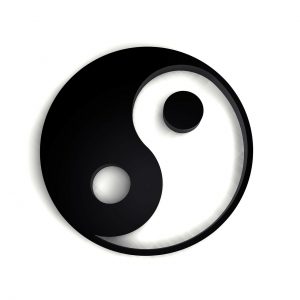Mr. Inamori *said, “We have a well-balanced humanity.” The phrases quoted by “” are Inamori’s words.
“A well-balanced person should have a rational attitude to analyze everything and always ask ‘Why this happen?’’. Those people tend to pursue everything logically and thoroughly to clarify the system behind the phenomenon. It refers to a person who also has a good humanity.”
Mr. Inamori explained the balance as above.
→ He pointed out 1 rationality, 2 humanity, and 3 balance.
1 Rationality
“Although everyone says you’re a good person, it does not always mean you can get the job done. For us to complete a great job, we must have rationality as scientists. A long time ago, when the sales guy came back from one of our clients and reported to me, ‘Well boss, this is difficult. I don’t understand what’s going on. ‘, I never allowed our staff to state irrational reasons. If we can’t understand the reasons or mechanism behind the facts, we would not be able to manage our company. We should prove all the events that happened in a corporate activity with rational logic.
→ I think this is whether or not things are in line with the laws of the universe. Is it in line with the reason of the universe, not with the emotion? It is important to determine if you are following the principle of law that anyone can clearly see as water flows from the high to the low. I think we should always describe our daily operation as if those events were natural phenomena.

2 Humanity
“No matter how good your analysis is and how smart you are to behave rationally, you won’t be able to get the help of those around you. You must have a humanity that makes your staff cooperate with you.
Most of the time, rational leaders never believe in something spiritual. ‘Can you believe in the world after death, the world of Buddha, or something you have never seen? I don’t believe anything that can’t be explained. ‘ They always say things like this. “
→I’ve heard that companies that have been successful for generations value religious ceremonies and rituals. This means ,in a sense, that humans tend to become humble against nature. Looking at natural disasters, most of which we can’t expect. In other words, what humans can do is limited, while nature has always overwhelmed us.
Don’t get arrogant.
Don’t be overconfident in your power.
When we feel the existence of something great, which we sometimes call God,Buddha or nature, we may be able to learn to remain humble. For that reason, I think Mr. Inamori mentioned that we should be aware of metaphysical things such as our souls and spirits.

3 Balance
“This means that we need a balance that has both scientific rationality and abundant humanity. We should never stay on the extreme of either side.
In my case, I’m completely rational in business at our company. I won’t believe anything strange or irrational. However, once I leave the company, I can believe in the spiritual realm, such as the world of Buddha at the other end of the spectrum. .. .. .. ..
The problem is when the two opposite personalities get unbalanced. If you immerse yourself in the world of Buddha and lean towards metaphysical and religious things, some people bring it to the place of management. Some consultants encourage extreme philanthropy, but this does not make any sense. I also preach the importance of “altruism” in management theory, but I am talking about a rational background. In the business world, you have to be a thorough rationalist, but otherwise you should be a romantic and metaphysical person. If you don’t balance both sides, you can’t be a top manager. “
→ I think this may have pointed out the Positive- yang- and Negative -yin- of the universe, the concepts prevailing in Asian philosophy.
Posi (Yang) and Nega (yin) are the inside and outside of things. The front side alone is not completed, and there is nothing that exists only on the back side. If you look at only shiny parts under the sun, you will not be able to look into the shadows. Also, if you look only in the shade(negative aspects), you will get stuck in a negative spiral. For both a single assignment in our job or an event in our lives happening every day, I think it’s important to look at both the Positive -yang- and Negative -yin-.

I learned about Positive-Yang- and Negative -Yin- and the theory of the universe (law), and the relationship between this and management.
Further queries or doubts, please email to ytomizuka@abrilsjp.com
News Letter subscription is here









